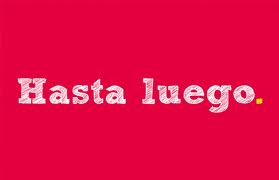I know that when you move abroad you shouldn't compare your culture and life to theirs, but some days it is unavoidable. The good thing is, I eventually snap out of it. I am smart enough to know that no one can be judged nor stereotyped. Do I eat cheeseburgers every day because I'm American? No, actually I hardly ever eat them. When I start to make a comment about Spain I take a step back and realize that I am living in a city that lacks diversity. Badajoz isn't a fair representation of the entire country, just like Iowa doesn't exactly represent the USA.
The following are a few things that Spaniards do that continue to baffle me.
1. "Now" = "Later"
This is very typical of the Spanish culture, many people make jokes about how Spaniards always put things off for "mañana" tomorrow. Number 1 on my list is the use of the word ahora (now).
Example: "Teacher, teacher, can we sit?" Her response, "no, no..ahora sentamos" = now we sit.. she really means, later we will sit- hmmm why not just say later? LUEGO!
2. Saying see you later or bye in passing instead of hello
Example: I see this happen every single day while out and about in the streets of Badajoz. Since the city is small, everyone knows everyone. When you pass someone on the street (or grocery store) do you keep walking past them and just say bye? or see you later? No. Where I come from we say "oh hello!" "how are you?" However, the Spaniards won't stop walking. Instead, they shout "bye!"
 |
| hasta lueggooooooo |
3. Kids cussing in class
Example: Either these curse words in Spanish aren't that harsh, or their perspective on foul language is different than ours because my students are always cursing in class. Last week the teacher took away some kid's paper airplane and he screamed "JODER!" (F*&#) She didn't even flinch!! Oh man, if anyone ever said the F word in school that was not going to go over well. They also say MIERDA (S&#%) a lot. I won't be able to wrap my brain around this....to me it is just disrespectful and not okay to let your little kids curse in public.
4. Lack of planning (in my village school)
Example: This isn't true for all teachers, however many of my teachers will approach me the day OF class and ask if I have anything prepared to do. My thoughts are, well...YOU are the teacher right? Lesson planning is rare and most of the time we just do whatever we want in class and hope the kids learn a new word or two. I understand that Americans have a different view on work and we are workaholics but I can't help but think of my mom (who works very hard in school) every time the school bell rings and the teachers are half way out the door. School starts at 9:30, we arrive at 9:28 on a good day. School ends at 2:30, we are half way out the door at 2:29. Amazing.
5. Peeling apple skins yet eating pig cheeks
Example: Every day at school we have a little breakfast break in the morning. Most teachers bring a healthy snack to tie them over until their midday feast. Apples are a popular fruit here in Spain, however the peel of the apple isn't so popular. I have never seen a Spaniard eat the peel of their apple. I've even asked one of them once, why don't you eat that? Don't you know that a lot of the vitamins and fibers are in the skin of the apple? They don't care. What blows my mind is that they will eat every and all parts of the pig but they can't eat an apple peel. They eat blood sausage, livers, pig cheeks..but apple skin!? EW!
6. The verb "tocar"
Rule number one in speaking other languages = do not translate literally.
Example: Sometimes I can't stop my brain from doing it. I am so comfortable with English that when I'm hearing Spanish, I literally am going over the translation in my head. It rarely works out to be correct if you say something literal. Yo tengo 22 años = I have 22 years..nope, doesn't work. When the verbs are used for meanings that don't make any sense in English, I often think about how strange they sound. One day in class, my teacher was having the students draw names out of a hat for an activity. She didn't want a student to choose their own name, so she would ask, "te has tocado a ti mismo?" Now..Tocar = to touch or play... In English this would literally mean, "Have you touched yourself" but what it means in Spanish is, "Did you pull out your own name/did you get your own name?" see what I mean? I couldn't help but giggle when she kept repeating this phrase.
Vale, venga, hasta luegooooo :)





No comments:
Post a Comment